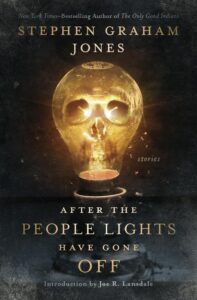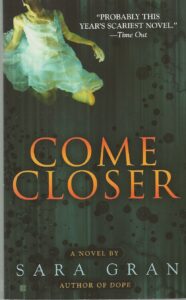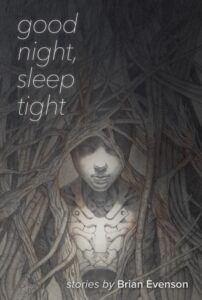When I was a child, I was afraid of everything. I was so afraid of heights that once when we were driving through the mountains and stopped at an overlook I refused to get out of the car, instead slipping down deeper and deeper into the footwell until my face was pressed to the floor mat. I don’t know how long my parents and my siblings stayed at the overlook, but I do know that I imagined them dying a dozen times—the cliff collapsing unexpectedly, my sister tripping and slipping over the edge, a runaway car suddenly veering into them and knocking them over, and so on. Finally my imaginings got so bad that, despite my fear of heights, despite the way the ground felt like it was rolling as I walked, I clambered out of the car and stumbled over to them, just to make sure they were okay. As soon as I saw they were, I turned and felt my dizzy and wavering way back to the car.
Article continues after advertisement
I think I started writing Horror to give my imagination a way of playing through worst case scenarios in a controlled space, try to understand how these could potentially play out. Somehow, because I was rendering them into language, controlling and directing them, it kept my mind from running quite so wild when I was out in the world.
I was also afraid of the dark. At bedtime, I used to start screaming if my parents turned all the lights off, so my parents got in the habit of leaving the hall light on and my door open a crack. I could see, through the crack, at the end of the hall, a slice of the living room and of the furniture and objects in it—normal, reassuring things from the daytime world. But once I was asleep my parents would turn the hall light off (my father was very thrifty when it came to electricity), which meant I would awaken in the middle of the night disoriented and confused, but too afraid to scream for my parents. My door was still open a crack, but on the other side was darkness.
As I stared into it, I would begin to make out shapes. Part of me rationally knew these were the same objects that were there if the light was on, but a part of me sensed those objects had been replaced by something else. Frightened, I would lie in the dark, staring at them until, without sensing it coming, I fell asleep. By morning they were always the same objects, but that sense that, for a few dark hours, they might have been something else, persisted: a very quiet and subtle fracturing of the surface of the daytime world. What that sense of wrongness did was to make me vigilant, make me aware of other moments of apparent slippage where the world feels off or wrong.
BOOKS RECOMMENDED BY BRIAN EVENSON


Writing Horror is about tapping into something that resonates for you, something that makes you feel, deeply, that there is something wrong with the world, something that feels frightening or off. If you set out to scare a reader, you usually fail. If you set out to remember and convey what it was like to be scared yourself, you just might get somewhere. It is not about you as a writer tricking the reader into being afraid, but instead about inviting the reader to share an experience with you. It is about remembering the fear or wrongness that you felt in your body, remembering what that felt like, what your body felt like, and then finding the right words to share it with the reader.
So much of the effectiveness of Horror is found in rhythm and sound, in the tiny provocations and hooks that a small gesture of language can make for the reader without the reader necessarily knowing how it’s happening. These are gestures that you find as you revise, and that are intuition as much as anything else. You know they are right because they feel right: they take you back to that vista you couldn’t bring yourself to look over or that dark room with something perhaps going on in the deeper darkness just through the crack of the door.
Here, says the Horror writer, through their language, here is a door into the darkness. I have been through and have left part of myself on the other side. I am going through again. Will you come with me?
And then, only once you go through: I’m not sure I’ll be able lead you out again.
_____________________________________________

Good Night, Sleep Tight by Brian Evenson is available now via Coffee House Press.
